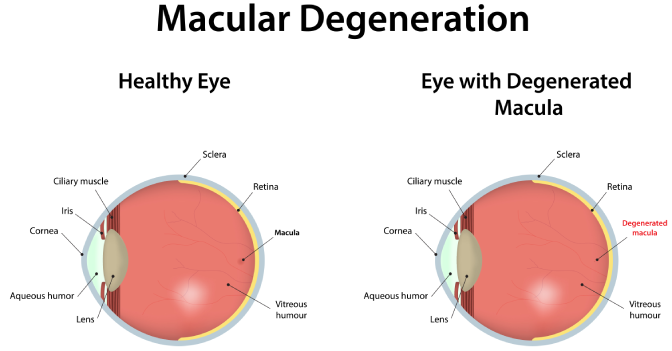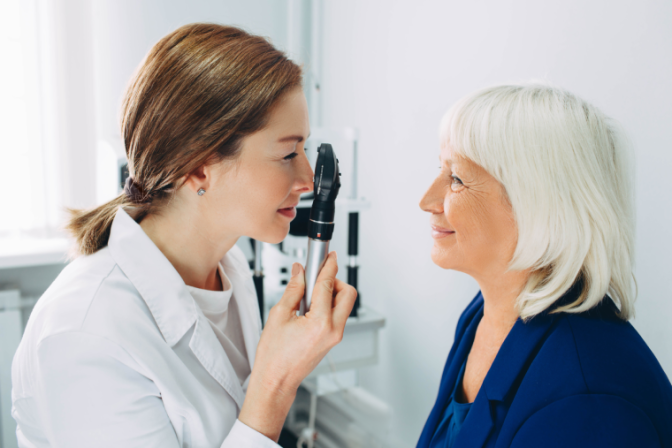Buy One, Get One 50% OFF Eyeglasses
* Restrictions apply. Ask a Team Member for details.
What is Macular Degeneration?
You've likely heard of macular degeneration and may even have concerns about someday developing this condition. But what is macular degeneration, exactly?
Also known as age-related macular degeneration (AMD), this eye disease is characterized by damage to part of the retina known as the macula. The macula is the part of the retina responsible for the detailed central vision we rely on to do all sorts of vision-intensive day-to-day tasks. Damage to this part of the eye causes blurred central vision, making it difficult to read, see fine details, or even recognize faces.
There are two different forms of macular degeneration — wet AMD and dry AMD. Symptoms, causes, and treatment options can vary depending on which form you’re experiencing.
Learn more below about macular degeneration from the eye doctors at Clarkson Eyecare and learn more about our macular degeneration eye care services.

The two forms of AMD
Dry macular degeneration is the most common form of AMD¹. It affects 80% of people who have been diagnosed with AMD. The hallmark of this form of the condition is a thinning retina, sometimes with areas of protein deposits known as drusen.
There's also the more serious wet form of AMD. With wet macular degeneration, vision loss is much quicker than with the dry form. This wet form brings with it fluid leakage from blood vessels, as the name implies.
Recognizing symptoms of AMD
Early on, you may not even realize you have AMD, particularly if you have dry AMD. Dry AMD does not usually have any symptoms in the beginning stage. But as the disease progresses in either form, symptoms do begin to emerge.
These can include:
Mild blurriness of central vision
Trouble seeing in low light
Distortion of straight lines, which may begin to appear crooked
A blurry spot at the center of vision that may grow bigger over time
Blank spots in vision
Less vivid colors
Macular degeneration is one of the leading causes of vision loss, particularly a loss of central vision, for people aged 50 and above. Although AMD does not typically lead to permanent blindness, it's important to monitor symptoms and seek treatment if you do begin to experience any listed above.
Causes and Risk Factors of AMD
AMD can be an inherited condition. If your parents had it, you are at a higher risk of developing the condition. However, those without a family history of AMD can also develop the condition.
What sets the dry form of AMD in motion remains a bit of a mystery. For some reason, the light-sensitive cells of the macula begin to break down with age. Some think this may be the result of damage to a support membrane. The macular breakdown is part of a very slow process and usually progresses differently between a patient’s two eyes.
Meanwhile, wet AMD happens when new, abnormal blood vessels begin to grow under the retina. Unfortunately, these easily leak fluid and blood, which can ultimately lead to macula scarring. This can cause a central blind spot, which can start small and grow larger with time. It's also possible for dry AMD to convert to wet AMD at any time.
Treatments for AMD
For both dry and wet AMD, there is not a treatment to cure the disease. However, Clarkson Eyecare does provide options to slow the progression of both forms of this disease. One of the main ways to treat wet AMD is with what's known as anti-VEGF injections². VEGF stands for vascular endothelial growth factor. These anti-VEGF medications have names such as ranibizumab (Lucentis), aflibercept (Eylea) and brolucizumab (Beovu). These medications slow the production of certain proteins to prevent new blood vessels from growing, stabilizing vision and in some cases, improve vision. The injections are usually given every month or two, as determined by your doctor.
Another approach that can be used is what's known as photodynamic therapy (PDT)³. With this treatment, you receive a shot of a light-sensitive medicine in your arm. The doctor will then shine a laser at your eye, which activates the medicine. This results in tiny blood clots forming in the macula, sealing off the leaky vessels. This PDT technique can be done alone or together with anti-VEGF injections. It may need to be repeated every few months. While there is currently no cure to either type of macular degeneration, the available treatments at Clarkson Eyecare can make a big difference for those with AMD, turning it into a manageable condition in many cases.

Schedule an Eye Exam at Clarkson Eyecare for Macular Degeneration Treatment
One of the keys to success with AMD treatments is to be mindful of the symptoms. If you suspect you may be in the early stages of either form of AMD, the best way you can help to preserve your vision is to schedule an eye exam as soon as possible.
Since this is a condition that, early on, may have no symptoms, getting routine eye exams is also important for ensuring that AMD does not go undetected. Catching it early helps you and your doctor develop a plan to treat it before symptoms have a chance to start occurring.
Learn more about the comprehensive eye exams offered at Clarkson Eyecare and schedule an exam today to get started.
Book Your Eye Exam at Clarkson Eyecare
Our experienced optometrists use the latest technology to provide high-quality care to patients everywhere. We currently have eye care centers in Arizona, Florida, Georgia, Illinois, Indiana, Kentucky, Michigan, Minnesota, Missouri, New Jersey, Ohio, Texas, and Virginia. Our coverage gives you access to affordable eye care and routine eye exams on your terms. Find your nearest location and schedule an appointment for a comprehensive eye examination today!